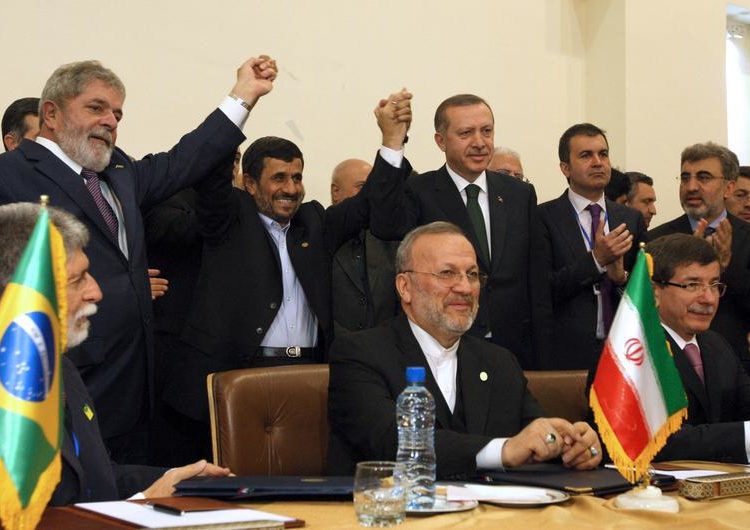Nordic Monitor
An important aide to Turkish President Recep Tayyip Erdoğan accused the then-foreign affairs minister, Ahmet Davutoğlu, of misguiding Erdoğan before the signing of a nuclear swap deal by Turkey, Brazil and Iran in 2010 and of placing too much trust in Iran, confidential documents, dated August 19, 2013, have revealed.
A secret wiretap authorized by a Turkish court as part of a corruption investigation in Turkey revealed that İlker Aycı, the then-president of the Investment Support and Promotion Agency of Turkey (ISPAT) and the current Turkish Airlines (THY) board chairman, met with one-time al-Qaeda financier Yasin al-Qadi on August 19, 2013 in order to facilitate al-Qadi’s investments and private businesses in Turkey. During the meeting, Aycı also informed al-Qadi of the foreign policy developments of the time and briefed him on the relationship between Erdoğan and Davutoğlu.
According to documents obtained by Nordic Monitor, Aycı accused Davutoğlu of misguiding Erdoğan before the nuclear swap deal was signed by Turkey, Brazil and Iran in May 2010 in Tehran. “The deal was a complete failure. Davutoğlu trusted Iran too much. Turkey would have been isolated and had more problems if Brazil had not participated [in the process]. The deal was his [Davutoğlu’s] first failure,” Aycı underlined.
“Davutoğlu is a romantic; there is, however, no place for romanticism in foreign policy… He’s a kind man, but not a good minister,” Aycı said.
In May 2010 then-Iranian President Mahmoud Ahmadinejad agreed to ship 2,640 pounds (1,200 kilos) of low-enriched uranium to Turkey, where it would be held in storage. In return, Iran would receive 264 pounds (120 kilos) of uranium enriched to 20 percent to be used at a medical reactor. The agreement was signed by Davutoğlu and his Iranian and Brazilian counterparts in the presence of Ahmadinejad, Erdoğan and then-Brazilian President Luiz Inacio Lula da Silva.
Aycı also said Davutoğlu made major mistakes in Turkey’s relations with Iraq, Libya and Tunisia and argued that he supported “the wrong groups” in those countries.

Davutoğlu served as foreign minister between 2009 and 2014. In 2014, when Erdoğan assumed the presidency, Davutoğlu succeeded him as prime minister. He later fell out with his former ally and was forced to resign as prime minister in 2016. He has occasionally waded into the public sphere to offer careful criticism of Erdogan’s one-man rule. However, Davutoğlu has opposed Erdoğan more forcefully since the beginning of 2019 and announced his resignation from Turkey’s ruling Justice and Development Party (AKP) in September 2019. He then formed a new opposition party, the Future Party (GP), in December 2019.
Transcript of the secret wiretap of a conversation among İlker Aycı, Yasin al-Qadi, his son Muaz al-Qadi (Kadıoğlu) and Abdulkerim Çay:
The then-prime minister, Erdoğan, did not trust Davutoğlu and his diplomatic initiatives during Davutoğlu’s tenure as foreign affairs minister, Ayci said at the meeting.
Aycı claimed that Erdoğan supported diplomatic initiatives led by then-Foreign Affairs Davutoğlu despite the lack of trust between the two. “If he [Erdoğan] were to remove the foreign minister, people might think Erdoğan, not the minister, had failed. Therefore, Erdoğan will not replace Davutoğlu, even though he doesn’t trust him,” Aycı told al-Qadi.
Aycı would remain chair of ISPAT until he was named chairman of the country’s national flag carrier, THY, in 2015. Aycı was involved in setting up the ruling Justice and Development Party’s (AKP) İstanbul office. He was also a consultant to Erdoğan during the latter’s term as mayor of İstanbul between 1994 and 1998.
Al-Qadi is an Egyptian-born Saudi national who was at one time flagged by the US Treasury and the UN al-Qaeda sanction committee. Al-Qadi was later removed from the UN list, followed by the US Treasury delisting his name.

Al-Qadi and Erdoğan’s son Bilal were leading suspects in an investigation into corruption pursued by prosecutors in Istanbul and were the subjects of detention warrants issued on December 25, 2013 by the prosecutors. However, Erdoğan stepped in, illegally preventing the execution of the warrants by ordering the police to ignore the prosecutor’s orders. After the removal of the prosecutors and police chiefs who were involved in the investigation, Erdoğan managed to whitewash the crimes of his associates.
The wiretap was authorized by the Istanbul 2nd High Criminal Court, which was looking into terrorism-related cases. The authorization was granted on August 19, 2013 as part of investigation file No. 2013/7296.












